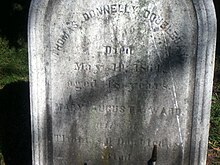Thomas D. Doubleday
Colonel Thomas Donnelly Doubleday | |
|---|---|
 Col. Thomas Doubleday | |
| Born | February 18, 1816 Albany, New York |
| Died | May 11, 1864 New York City |
| Buried | |
| Allegiance | United States |
| Service | Union Army |
| Years of service | 1861-63 |
| Rank | |
| Commands | 4th New York Heavy Artillery |
| Battles / wars | American Civil War |
| Spouse(s) | Mary Augusta Ward |
| Relations | Ulysses F. Doubleday (father) Abner Doubleday (brother) Ulysses Doubleday (brother) Stephen Ward Doubleday (son) |
| Other work | Governor of the New York Stock Exchange |
Thomas Donnelly Doubleday (February 18, 1816 – May 11, 1864) was an American bookstore owner and a Union Army officer in the American Civil War.
Biography
Doubleday was the son of U.S. Congressman Ulysses F. Doubleday and Hester Donnelly. He was born on February 18, 1816 in Albany, New York.[1] He grew up in Auburn, New York, and was the older brother of Abner Doubleday and Ulysses Doubleday, who both fought in the Civil War.
Known as T. D. Doubleday, he ran a well known book and stationery store on Wall Street. Along with other merchants and prominent New Yorkers he advocated the founding of the Metropolitan Museum of Art and the American Museum of Natural History.
In the Civil War, he was a colonel and organized the 4th New York Heavy Artillery. He raised and trained this regiment from New York that was stationed in Washington DC to defend the capital during the Civil War.[2] He resigned his commission in early 1863.
Doubleday and his wife, Mary Augusta Ward, resided on Staten Island. They had two children, Mary Augusta Sargent and Stephen Ward Doubleday. 17-year-old Stephen also served in his father's regiment as a lieutenant and was injured during the war.
Thomas D. Doubleday died on May 11, 1864 in New York City, after he had been accidentally run over by horse-drawn coach. He was buried on Staten Island/Trinity Cemetery adjacent to 1562 Richmond Terrace.


References
- ^ http://mchistory.org/research/resources/ulysses-freeman-doubleday.php
- ^ "4th Heavy Artillery Regiment". New York State Military Museum. Retrieved 2007-11-24.
